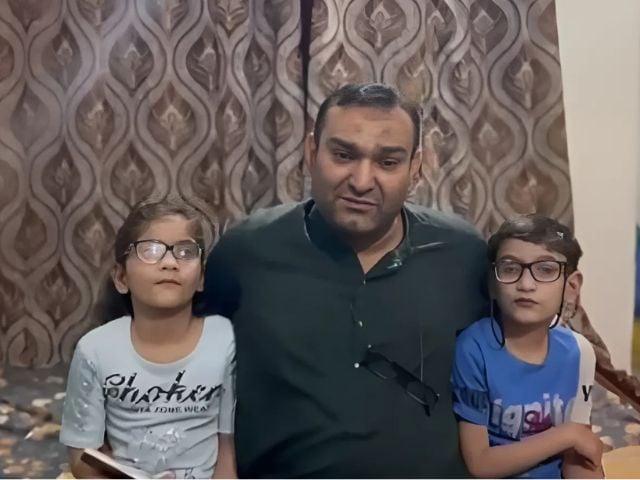The father two children returned by India last week congratulated the chief of staff of the army, General Asim Munnir, of having taken responsibility for the treatment of sick children.
The children, Abdullah (9) and Mansa (7), both suffering from a congenital heart disease, had traveled with their father, Shahid Ahmed, in Faridabad, India, in April for vital surgery.
After successful pre-surgical assessments on April 22 and 23, the family was ordered by the regional registration office for foreigners from India on April 24 to leave the country within 48 hours.
Expulsion occurred in the wake of Pahalgam’s attack in the Pahalgam region, Jammu and cashmere illegally occupied illegally, after which the Indian government took the controversial measure to even deport Paskistani patients who underwent treatment.
Shahid Ahmed, a Hyderabad resident, Sindh, condemned the decision, calling him “inhuman and contrary to ethics”.
“There is no religion greater than humanity. Even Hinduism teaches compassion,” he said, adding that it had taken him seven years to obtain an Indian visa for the treatment of his children.
Upon their return to Pakistan, General Munir facilitated admission to children at the Institute of Cardiology of the Armed Forces (AFIC) in Rawalpindi. Shahid expressed a deep gratitude to the army chief, saying that AFIC care has exceeded his expectations.
Dr. Mehboob Sultan of AFIC confirmed that the two children suffer from Fallot tetralogy, a congenital condition involving cardiac malformations and underdeveloped pulmonary arteries.
Their treatment will include progressive surgeries, with the first phase which should take place in the coming days.
Brigadier, Dr. Khurram Akhtar, said that AFIC is fully equipped to deal with complex heart conditions in children and adheres to international medical standards. “There is no need to send such cases abroad. We have carried out many successful surgeries here,” he added.
Tensions between India and Pakistan reached new heights following a fatal attack on April 22, 2025, when 26 men were killed on a tourist site in Pahalgam, in Indian, illegally occupied Jammu and Cashmere (iiojk). India quickly blamed the Pakistani elements for the attack, but no evidence was presented to support the complaint, which Islamabad vehemently denied.
In response to the attack, the security committee of the Cabinet of India approved several reprisal measures on April 23, including the closure of the Wagah-Attari land transport point, a travel notice urging Indian nationals to avoid Pakistan, an official notification of the suspension of the Industry Water Treaty and the revocation of several categories of visa for Pakistan.
On April 24, the National Security Committee of Pakistan (NSC) issued a severe warning, declaring that any attempt by India to block the flow of water in Pakistan would be considered an act of war. The NSC has also approved the closure of the Wagah border passage.
The next day, on April 25, the Pakistani Senate unanimously adopted a resolution rejecting the allegations of India concerning Pahalgam’s attack, calling them baseless and politically motivated.
Tensions also intensified on April 26, when the Pakistani High Commissioner in London was vandalized during a demonstration of hundreds of pro-India and Pro-BJP demonstrators.
The demonstrators caused hardware damage, including broken windows and paint splashes with saffron. Pakistan accused India of encouraging violence, the Federal Minister of Information Attaullah Tarar condemning acts as being supported by “the Indian state and the agencies”. British police then arrested two people suspected of participation in the incident.




